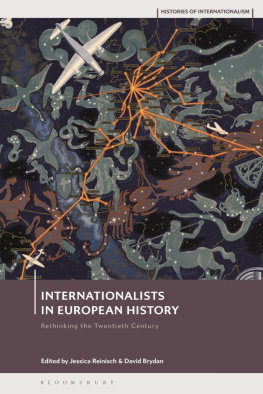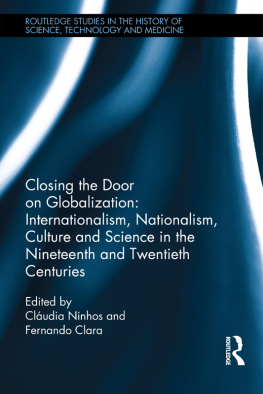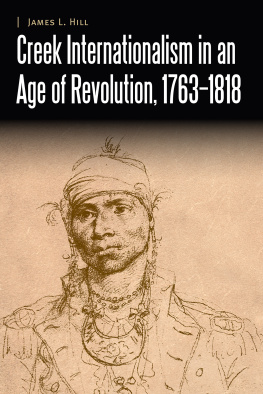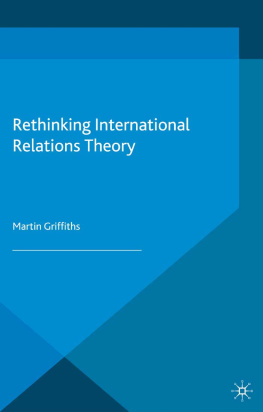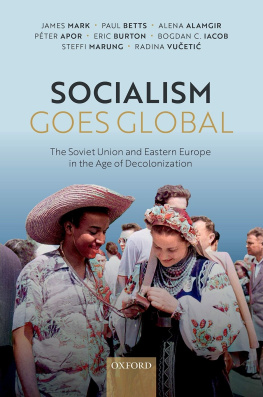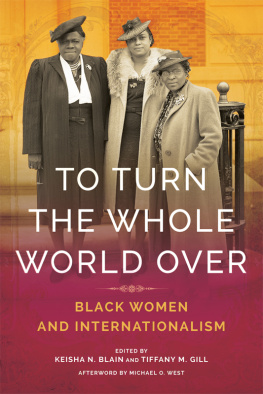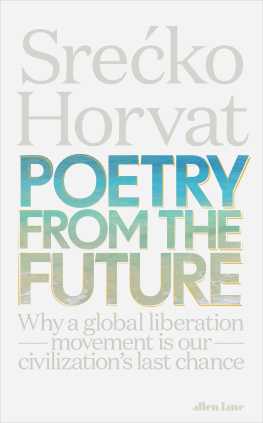Kornelija Ajlec is Associate Professor of Contemporary History at the Faculty of Arts, University of Ljubljana. She is a member of a national research programme, Slovene History (P6-0235), the Joint History Project at the Center for Democracy and Reconciliation in Southeast Europe and editor-in-chief of the Retrospektive: Academic Journal for Historiography and Related Fields . In 2016, she was a Fulbright visiting scholar at Rollins College in Winter Park, the UN Archives in New York and the US National Archives, College Park. Her research focuses on diplomatic relations of postSecond World War Yugoslavia with the United States and international organizations.
Monika Bar is Professor by Special Appointment in Central European Studies at the Institute for History at Leiden University. Her current research revolves around the history of disability and disability movements paying special attention to intersections with class, race, gender and displacement. She is principal investigator of the ERC Consolidator Grant Rethinking Disability: the Global Impact of the International Year of Disabled Persons (1981) in Historical Perspective. She is co-editor with Paul van Trigt of the special issue of Diplomatica: A Journal of Diplomacy and Society (2019) on Scripts for a New Stage: The United Nations Global Observances and the edited volume Marginalized Groups and the post-War Welfare State in Historical Perspective: Whose Welfare? (2019).
David Brydan is Lecturer in the History of Modern International Relations at Kings College London. He works on the history of international cooperation and exchange in the twentieth century, and on modern Spanish history. His book, Francos Internationalists: Social Experts and Spains Search for Legitimacy (2019), is available as an open access book with Oxford University Press.
Valeska Huber is Head of the Emmy Noether Research Group Reaching the People: Communication and Global Orders in the Twentieth Century at the Department of History, Free University of Berlin. In her research, she focuses on communication in various forms, from migration and mobility to epidemics and international health regimes, and, more recently, the politics of mass communication in the twentieth century, with a specific interest in education and language. She is the author of Channelling Mobilities: Migration and Globalisation in the Suez Canal Region and Beyond, 1869-1914 (2013) and co-editor (with Jrgen Osterhammel) of Global Publics: Their Power and Their Limits 1870-1990 (2020).
Kristy Ironside is Assistant Professor of Russian History at McGill University. Her first monograph, A Full-Value Ruble: The Promise of Prosperity in the Postwar Soviet Union , is forthcoming with Harvard University Press in the spring of 2021. She is in the early stages of a second project on the Soviet Union and international copyright.
Vincent Lagendijk is Assistant Professor in the history department at Maastricht University. Vincent holds a PhD in the History of Technology from Eindhoven University of Technology, and was named postdoctoral fellow at the German Historical Institute in Washington, DC, for 201718. He is primarily interested in the history of international organizations, the role of experts and technology, the history of infrastructure, and transnational connections. He has worked on the notion of Europe in relation to the construction of electricity networks, and is currently preparing a monograph on a global history of the Tennessee Valley Authority (TVA). His most recent research focuses on the intersection of road-building and racism in the city of Baltimore.
Daniel Laqua is Associate Professor of European History at Northumbria University in Newcastle upon Tyne, UK. His work is concerned with the dynamics and tensions of transnational activism, covering a variety of international movements and organizations. He has explored these themes in his monograph The Age of Internationalism and Belgium, 18801930: Peace, Progress and Prestige (2013). He is the editor of Internationalism Reconfigured: Transnational Ideas and Movements between the World Wars (2011) and has co-edited International Organizations and Global Civil Society: Histories of the Union of International Associations (2019) and Imagined Cosmopolis: Internationalism and Cultural Exchange, 1870s1920s (2019). His current research addresses the role of internationalism within university settings between the 1920s and the 1960s.
Jo Laycock is Senior Lecturer in Migration and Diaspora History at the University of Manchester. She is the author of Imagining Armenia: Orientalism, Ambiguity and Intervention (2009). Her current research focuses on refugee relief and resettlement in Soviet Armenia.
Sawomir otysz is Professor at the Institute for the History of Science in the Polish Academy of Sciences in Warsaw, Poland. He has conducted research and published on themes in history of technology more generally, including inventiveness and technology transfer. He is also engaged in studying the environmental history. Recently, he has written a book on UNRRA penicillin plant programme in East-Central Europe, Fabryka z darw. Penicylina za elazn kurtyn 1945-1954 ( Donated Factory: Penicillin beyond the Iron Curtain 1945-1954 ). He has been the president of ICOHTEC, the International Committee for the History of Technology, during 201721.
Carmen M. Mangion is Senior Lecturer in the Department of History, Classics and Archaeology at Birkbeck, University of London. Her research examines the cultural and social history of gender and religion in the nineteenth- and twentieth-century Britain. She is the author of Catholic Nuns and Sisters in a Secular Age, Britain 1945-1990 (2020) and Contested Identities: Catholic Women Religious in nineteenth-century England and Wales (2008), and other publications on gender and religion in Britains nineteenth-century medical marketplace. Her current research examines the gendered nature of the Catholic medical missionary movement of the early twentieth century in both Britain and Ireland.
Elidor Mhilli is Associate Professor of History and Public Policy at Hunter College of the City University of New York. He holds a PhD from Princeton University, and has been a visiting scholar at Columbia University, the University of Pennsylvania, New York University, Birkbeck, University of London, and the Zentrum fr Zeithistorische Forschung in Potsdam, Germany. His book From Stalin to Mao: Albania and the Socialist World (2017) received the Marshall D. Shulman Book Prize, the Davis Center Book Prize and the Stavro Skendi Book Prize.
Brigid O'Keeffe is Associate Professor of history at Brooklyn College of the City University of New York. She is the author of New Soviet Gypsies: Nationality, Performance, and Selfhood in the Early Soviet Union (2013) and Esperanto and Languages of Internationalism in Revolutionary Russia (forthcoming). She is also preparing a manuscript for Bloomsburys Russian Shorts book series that will present in compact and accessible format the history of the Soviet Union as a multi-ethnic empire.
Kiran Klaus Patel holds the chair of European history at Ludwig Maximilian University Munich (LMU). Before joining LMU, he held chairs at Maastricht University in the Netherlands (201119) and the European University Institute in Florence, Italy (200711), and an Assistant Professorship at Humboldt University in Berlin (20027). His publications include Project Europe: A History (2020), Nazism across Borders: The Social Policies of the Third Reich and their Global Appeal (2018, edited with Sandrine Kott) and The New Deal: A Global History (2016).

